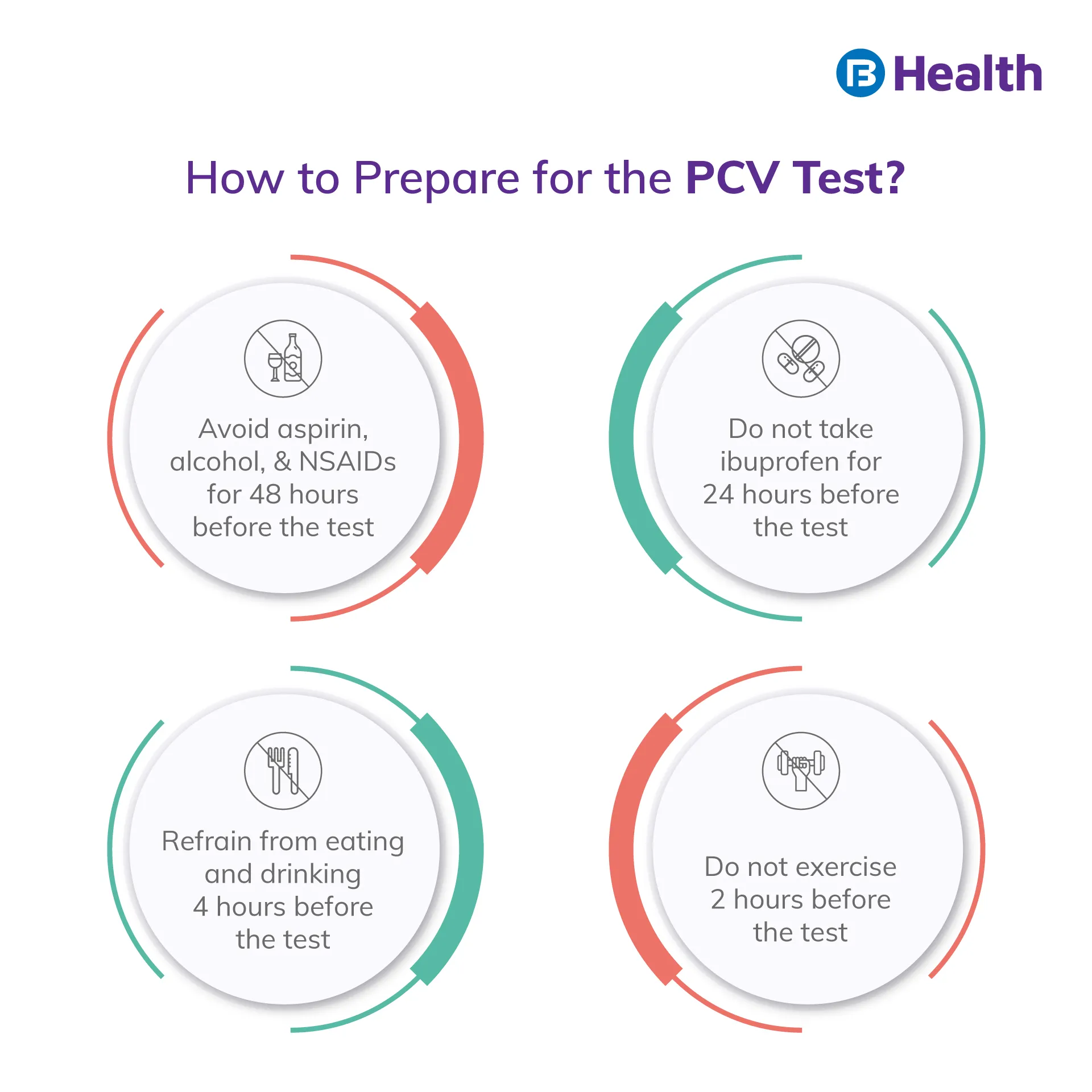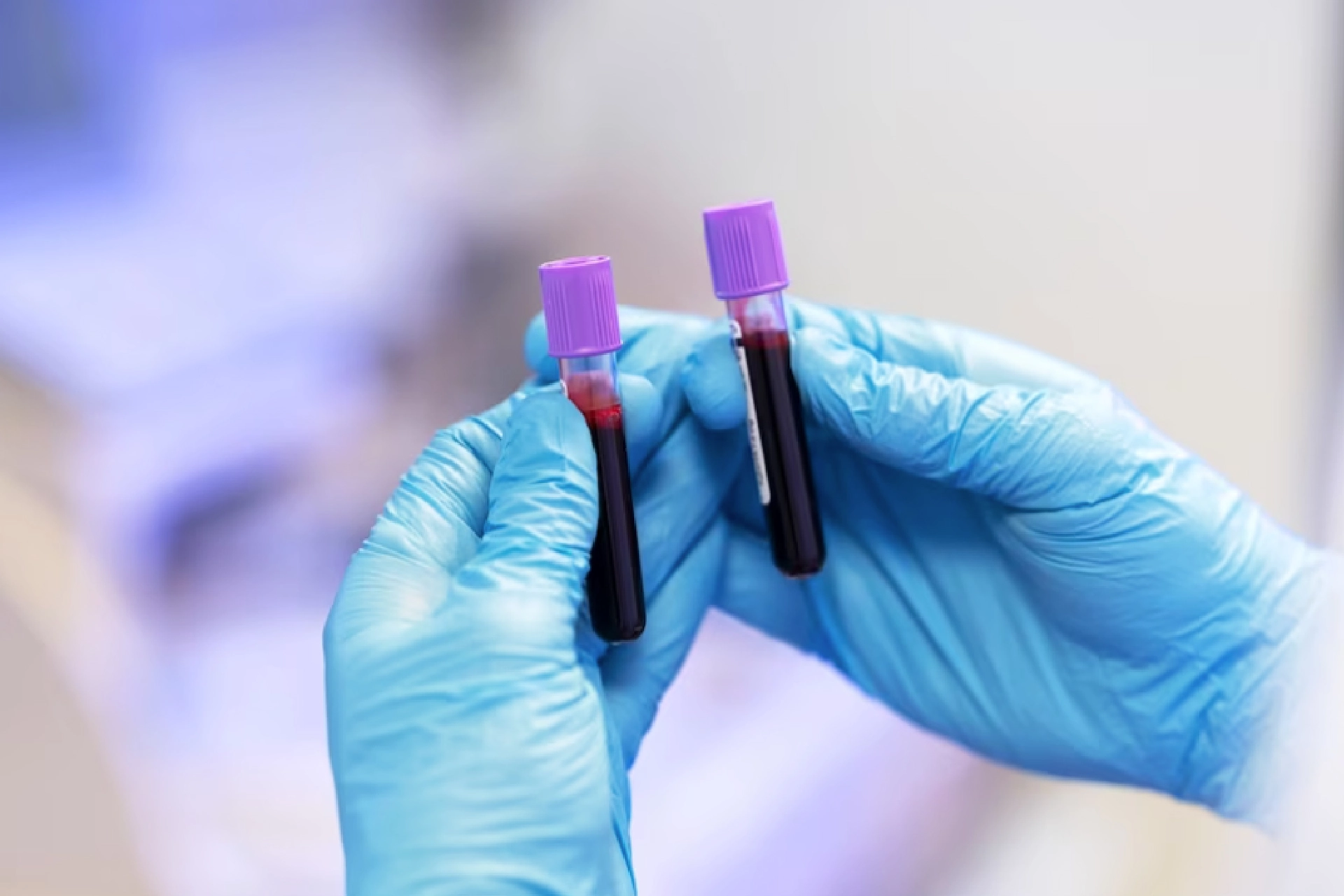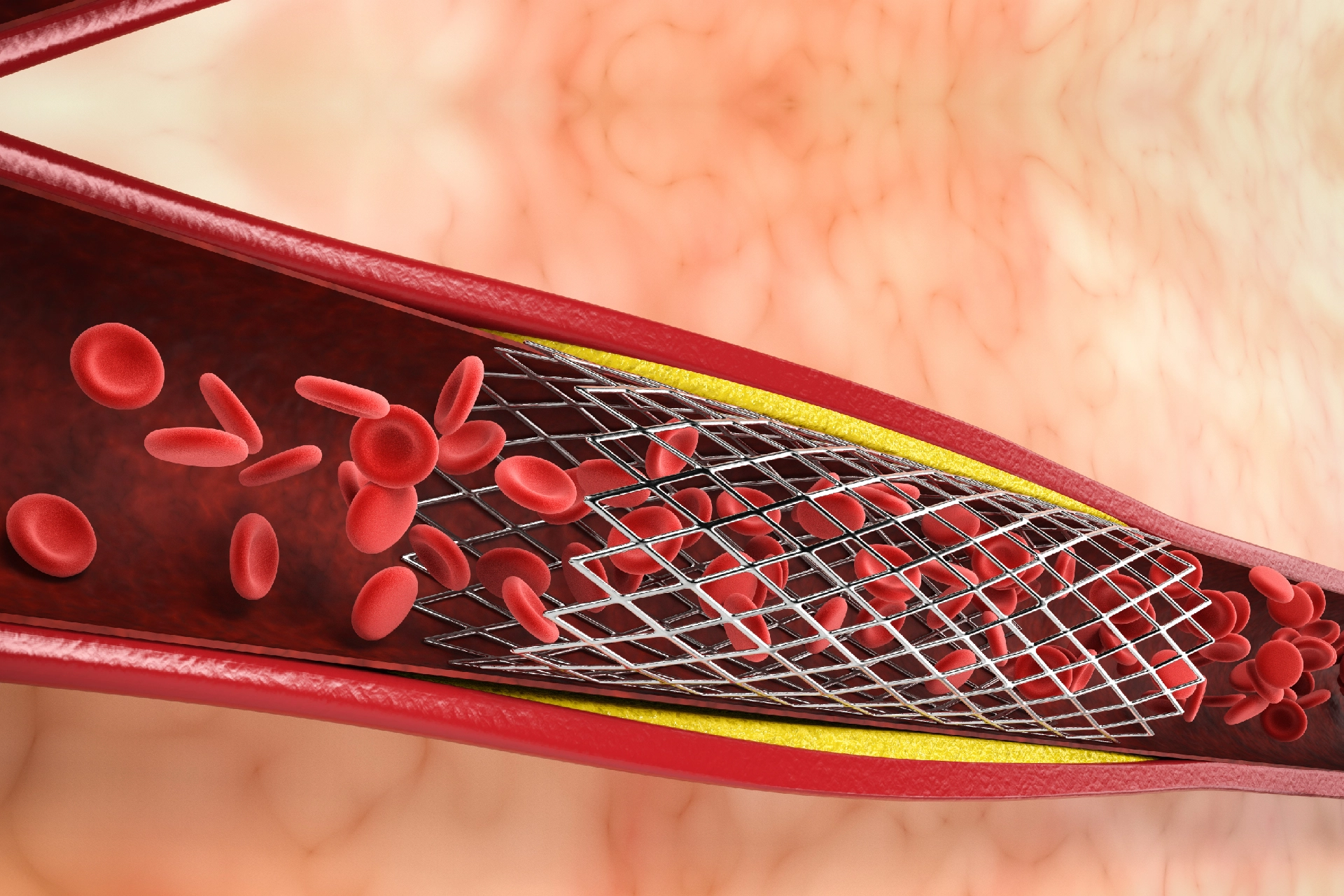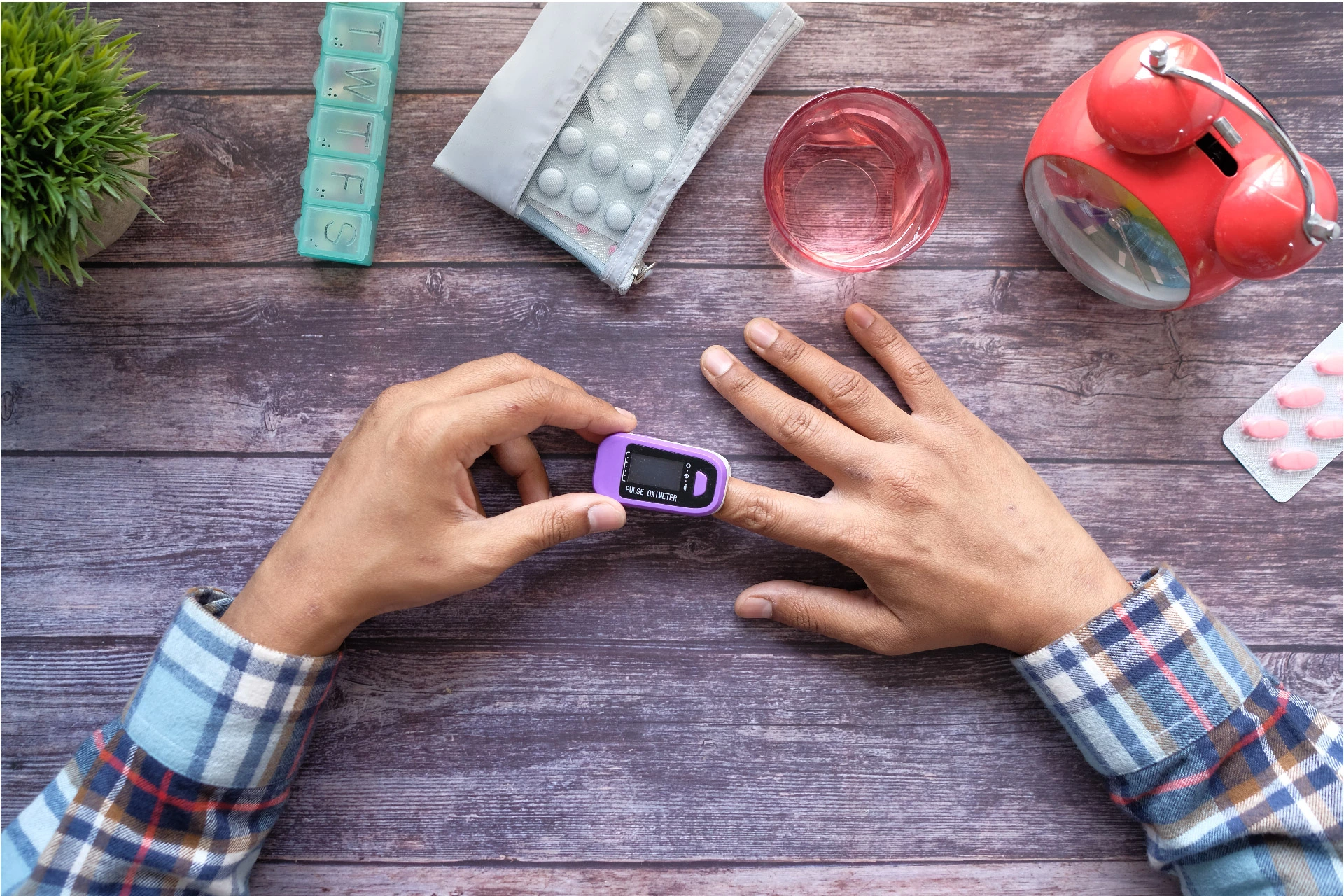Health Tests | 7 min read
Packed Cell Volume (PCV) Test Normal Range and Result
Medically reviewed by
Table of Content
Synopsis
The Packed Cell Volume Test is used to help determine whether or not a patient has anemia. It involves taking a blood sample and checking the number of red blood cells to see if it falls in the normal range. PCV test normal range is between 35% to 48%, with most samples falling within this range.
Key Takeaways
- The Packed Cell Volume Test is used to help determine whether or not a patient has anemia
- The normal range for this test is between 35% to 48%
- The cost of this test will vary depending on the labs you choose
A PCV test's normal range is between 35% - 48%. PCV testing helps diagnose anemia and is also used to monitor a cancer patient's response to chemotherapy treatment.
What is the Packed Cell Volume (PCV) Test?
The packed cell volume (PCV) is a PCV blood test that measures the percentage of red blood cells in your blood. Red blood cells are the most common type of cell in the body and carry oxygen to all body parts.
When you have anemia, your body cannot produce enough red blood cells, or they don't break down properly. As a result, anemia can lead to symptoms such as fatigue or shortness of breath when you exercise or do strenuous activities like gardening or running errands around town.
PCV Test Normal Range
The values of the PCV test normal range are:
- Between 35% - 48%
- Idea range for females is 35.5-% to 44.9%, and for males, it is 38.3% to 48.6%
- Low PCV in blood test results is less than 30%, and High PCV is more than 50%
Procedure of Packed Cell Volume Test
The packed cell volume test (PCV) is a method of testing for pneumocystis jirovecii infection. It is used to diagnose and monitor the severity of pneumocystis jirovecii pneumonia in patients with symptoms such as fever and cough.
This test involves taking a fluid sample from a patient's lungs and placing it into a special device to measure the amount of water in the sample. The PCV test measures the amount of air removed from the sample, indicating the presence of bacteria, if any.
If bacteria are present in the sample, they will cause an increase in pressure inside it that will increase volume (or decrease if they are removed). The PCV test uses this volume change to determine if any invasive organisms are present within your lungs.
What Happens During a Packed Cell Volume Test?
A packed cell volume test is a blood test that measures the number of red blood cells, or RBCs, in your blood. It's used to determine if you have anemia or an overabundance of RBCs.
If your packed cell volume (PCV) is low (less than 70%), you have some disorder that blocks the normal production or distribution of red blood cells. Low PCV can be caused by diseases such as chronic inflammation and infections like HIV/AIDS or hepatitis C virus (HCV). High PCVs are common in people with chronic liver disease due to cirrhosis; however, some other causes are more serious, including leukemia, sickle cell disease, and thalassemia. [1]
Additional Read: Antinuclear antibodies blood test
Preparation for the PCV Test
When preparing for a packed cell volume test, you must know what medications you are taking. You should also be aware of any foods or drinks that might affect your results.
If you have taken any drugs in the last two days - cold or fever medicine, or antibiotics, then wait at least one week for the test.
Medicines to avoid before the Packed Cell Volume Test:
- Avoid aspirin, alcohol, and NSAIDs for 48 hours before the test
- Avoid ibuprofen for 24 hours before the test
- Avoid food and drink 4 hours before the test
- Avoid exercise 2 hours before the test
Measuring the PCV Test
The two methods for measuring the PCV test are manual and automated. The manual method involves taking multiple samples as often as necessary until the desired result is achieved. This method takes longer than an automated version. Still, many doctors prefer it because it allows them to take a more accurate reading. The automated version is faster and uses fewer samples than the manual version but requires expensive equipment. In addition, it may not always provide an accurate reading due to inaccuracies in its readings or other factors.
Risks Associated with PCV Test
There are no risks associated with a PCV test. You can feel free to take some time off from work or school if necessary, and there is no need for special preparations. The only requirement is that your test should be done at a lab that follows proper safety measures. If you're worried about potential complications during the procedure, feel free to ask questions before booking an appointment with your doctor or clinic.
Additional Read: Karyotype TestResults of the Packed Cell Volume Test and Its Interpretation
The packed cell volume (PCV) test is a blood test that measures red blood cells in circulation. The results of this test are used to assess your body's health and determine if you have anemia, polycythemia, dehydration, or other conditions that could lead to an abnormal result.
PCV test normal range is anywhere between 35% and 48%. If your PCV falls below 35%, it may indicate anemia; if it rises above 50%, it may indicate polycythemia. A high-grade infection can also cause elevated PCVs on routine tests; however, determining the condition during testing will allow for appropriate treatment choices before serious complications arise from ongoing infections such as sepsis.
PCV Test Results
If you have a low PCV in a blood test, it can be normal or abnormal. Low levels can also be caused by anemia, blood loss due to surgery, or infection.
If your packed cell volume is high, and you're still experiencing symptoms like fatigue and headaches, then high PCV could indicate that your kidneys aren't filtering out toxins well enough, so they get into the bloodstream.
Additional Read: Serum Iron Test: Procedure, Results
Factors That May Alter Your Results
The PCV test normal range is between 30% and 45%. If you have high levels of packed cell volume, it can be caused by the following:
- Anemia (low hemoglobin) or iron deficiency (anemia): You may also see signs of your liver not working properly, such as fatigue, shortness of breath, and headaches
- Blood disorders such as leukemia or myelofibrosis (types of cancer)
When is a Packed Cell Volume Test Done?
Anemia:
If you have anemia, your doctor will order a packed cell volume (PCV) test to check for low red blood cells.
Bleeding:
A bleeding disorder can cause low PCVs and hemoglobin levels in the blood, which may be seen on this test.
Infection:
If you have been exposed to an infection or are taking medications that suppress the immune system, your doctor might recommend this blood test to make sure it doesn't get worse.
Cancer:
This type of blood analysis may be recommended when there's tumor growth in tissue near where cancer cells spread throughout your body
What does a PCV Test do?
The PCV test helps identify the chronic obstructive pulmonary disease (COPD). It is an umbrella term that describes a group of lung diseases that make breathing difficult.
The best way to understand what the PCV test does is by telling you how it works. A blood sample is taken from your arm and tested for colony-stimulating factors (CSF), which are proteins involved in cell growth and division. If there's an increased level of these CSFs, it could mean that your lungs have been damaged by smoking or exposure to other environmental toxins, such as poor air quality or indoor pollution during pregnancy, or childhood growth spurts.
Use of PCV Blood Test
The Packed Cell Volume Test determines the amount of protein in a sample. The sample is mixed with a liquid called ethanol to measure the volume of the mixture that has been dissolved.
A packed cell volume test helps determine the amount of protein in a sample, which will help you decide what type of protein you need to use when making a new batch of food products.
Cost of PCV Test in India
The approximate cost of a PCV test in India ranges from Rs. 100-400.
Talk to a Doctor Before Interpreting the Results
A hematologist is a doctor who specializes in blood disorders. It is always advisable to talk to a doctor before interpreting lab test results.
A PCV test is used by doctors as part of their routine checkups, especially if they have been diagnosed with anemia or leukemia and need regular monitoring after treatment or follow-up appointments (which may include frequent blood tests).
As you can see, a pcv test normal range helps evaluate a patient's health. So, it is better to get this done if you are advised to by your doctor. Visit Bajaj Finserv Health to get an online doctor consultation from the comfort of your home.
References
- https://genomemedicine.biomedcentral.com/articles/10.1186/s13073-018-0556-z
Disclaimer
Please note that this article is solely meant for informational purposes and Bajaj Finserv Health Limited (“BFHL”) does not shoulder any responsibility of the views/advice/information expressed/given by the writer/reviewer/originator. This article should not be considered as a substitute for any medical advice, diagnosis or treatment. Always consult with your trusted physician/qualified healthcare professional to evaluate your medical condition. The above article has been reviewed by a qualified doctor and BFHL is not responsible for any damages for any information or services provided by any third party.





